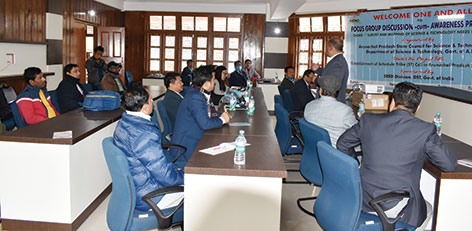MECHUKHA, 31 Dec: Science & Technology Secretary Ajay Chagti emphasized on employment generation and uplifting the living condition of the people through science and technology interventions and innovative ideas.
He suggested to the scientists and engineers of his department to focus more on employment generation, rather than on the achievements and outcomes of researched-based projects.
Chagti was speaking on the occasion of the celebration of the Azadi Ka Amrit Mahotsav by the autonomous organizations of the science & technology department, like the Arunachal Pradesh State Council for Science & Technology, the Centre for Earth Sciences & Himalayan Studies, the State Remote Sensing Applications Centre and the Centre for Bio Resources and Sustainable Development, based on the theme, ‘Survey and mapping of science and technology needs in the state’ here in Shi-Yomi district on 28 December.
He said that the department should set a specific goal to meet the basic needs of the rural people, who are deprived of development.
“Scientific communities have to play important role, while focusing on sustainable development through new ideas and innovative technologies,” Chagti said.
Expressing dismay over the poor condition of the roads, he stressed on “survey and investigation of soil properties as well as soil stabilization and mapping of proper drainage system in the state before starting the construction activities.”
Arunachal Pradesh State Council for Science & Technology (APSCS&T) Director CD Mungyak said that the science & technology department would conduct awareness programmes on the achievements of the department every year in different parts of the state to sensitize the people to the importance of research activities undertaken by the department.
APSCS&T Centre for Bio Resources and Sustainable Development Project Director Dr Debajit Mahanta informed that “the ‘khao noh’ rice is in the final stage for geographical indication (GI) registration for Arunachal.”
Scientists from the Patent Information Centre have been visiting Namsai periodically to gather information about the rice variety khao noh, required for GI registration, Dr Mahanta said, adding that the chemical analysis of the rice has been carried out by the Itanagar branch of Jorhat (Assam)-based CSIR-NEIST, and that “herbarium has been submitted to the Botanical Survey of India.”
Highlighting various training programmes being conducted by the State Council for Science & Technology on skill development and self-employment, Dr Mahanta said that a study on the traditional alcoholic beverage ‘black apong, chang’ is being conducted for its preservation and commercialization, in active collaboration with the chemistry department of the Dibrugarh University, Assam.
Centre for Earth Sciences & Himalayan Studies Director Tana Tage said that the centre is proposing to establish a state-of-the-art analytical laboratory in Arunachal.
“Such facilities would strongly substantiate the field data for understanding the geodynamic evolution of the Himalayas, geological surface processes such as landslides, avalanches, cloudbursts and extreme events, and help in mitigating natural geo-hazards,” he said.
“Besides, it would add significance to the knowledge base as it provides geo-science support to other government agencies and caters to the analytical facilities of various institutes, like universities, colleges and other state and central government organizations,” Tage said.
He said that the centre is planning to have its “state earth science museums, which would showcase the evolution of the geological past of the Himalayas, unravelling a great story about the loftiest and youngest mountain chain of the world, its origin, evolution, environment and natural resources.”
“This museum would be having a repository section on published specimens of a variety of fossils such as mega and micro vertebrates, pollen/spores, etc, which are essential as reference material for future research activities and help to train the young minds of upcoming geoscientists,” added Tage.
State Remote Sensing Application Centre Joint Director Liagi Tajo made a presentation on what impact climate change and depletion of natural resources have on the socio-economy of the Arunachal Himalayas, using an indigenous technological approach to understand the impacts of climate change.
DoNER Joint Secretary Anuradha S Chagti and Shi Yomi Deputy Commissioner Mito Dirchi also attended the programme.



